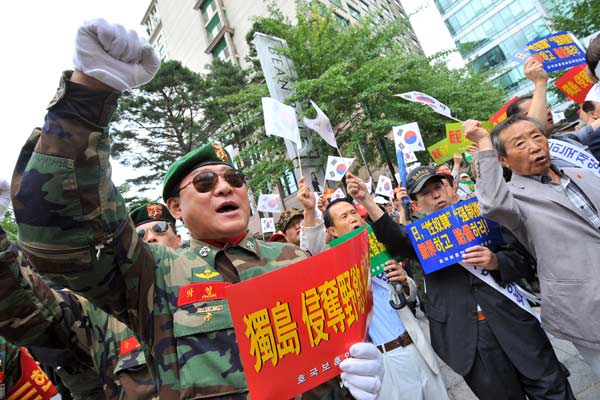
Bilateral spats continued to erupt on Thursday as Seoul protested Tokyo's accusation over their disputed islands, and Tokyo reportedly refused to accept its letter that Seoul returned.
|
 Protesters march outside the Japanese embassy in Seoul on Thursday amid a continuing row over disputed islands. [Photo by Jung Yeon-je / Agence France-Presse] |
Japanese newspaper Asahi Shimbun said on its website that an official from the South Korean embassy in Tokyo visited the Japanese Foreign Ministry on Thursday evening, presumably with the protest letter written by Japanese Prime Minister Yoshihiko Noda and sent on Aug 19, but the South Korean official failed to enter the ministry.
Seoul earlier announced its decision to return the letter, in which Tokyo protests South Korean President Lee Myung-bak’s Aug 10 visit to the disputed islands and remarks made by Lee regarding Japanese Emperor Akihito.
Hundreds of South Koreans protested in front of Japan’s embassy in Seoul on Thursday against Japan’s rival claim over the disputed islands, which South Korea calls Dokdo and Japan calls Takeshima.
In the wake of Lee’s visit to the islands, Japan lodged the dispute over the islands with the International Court of Justice, a move rejected by Seoul. South Korea has long accused Japan of turning a blind eye to historical issues.
In addition, Japanese Foreign Minister Koichiro Gemba called South Korea's control over the islands "illegal" on Wednesday, a move that sparked South Korean Foreign Ministry’s official protest on Thursday.
And Tokyo on Thursday vowed to toughen measures on its rival claims over the islands against its neighbors amid a worsening diplomatic deadlock and upcoming domestic power reshuffle.
Noda, haunted by domestic political turbulence and poor polls, hinted that he is planning to hold the general election of the House of Representatives in early November, Kyodo News Agency quoted senior lawmakers of opposition Liberal Democratic Party as saying on Thursday.
Japanese Cabinet members on Thursday kept expressing hard-line stances over Japan’s rival claims over islands with China and South Korea.
The prime minister expressed to the lower house his will to confront the issues and vowed measures to "beef up maritime surveillance" over China’s Diaoyu Islands in the East China Sea as well as the islands that Japan and South Korea both claim.
Japanese Defense Minister Satoshi Morimoto said that the Japanese Self-Defense Forces troops "will not allow any foreign ship to approach even 1 millimeter".
Kyodo said that on Wednesday, the United States reaffirmed during a meeting in Washington between US and Japanese senior officials that the Diaoyu Islands issue falls under the scope of the US-Japan Security Treaty .
Shinsuke Sugiyama, director-general of the Asian and Oceania Affairs Bureau at the Japanese Foreign Ministry, told reporters that the US assistant secretary of state for East Asian and Pacific affairs, Kurt Campbell, repeated Washington’s stance over the islands.
The treaty, signed in 1960, obliges the US to defend Japan if it is attacked.
At the end of its occupation of Okinawa in 1972, the US transferred the "administrative rights" of the Diaoyu Islands to Japan. China has never recognized the deal "giving" them to Japan.
Washington and Tokyo on Tuesday began a military drill in the US' western Pacific islands of Guam and Tinian, an exercise that involves retaking an island.
Reports said the drill is aimed at "taking back" the Diaoyu Islands, and analysts said the US was throwing its military weight behind Japan over the Diaoyu Islands issue.
Contact the writers at [email protected] and [email protected]